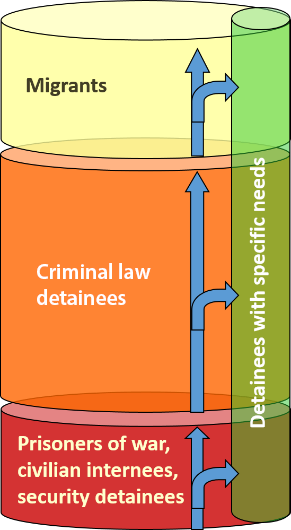ICRC detention work: Why, where, who?
Why does the ICRC visit detainees?
By definition, detainees are
potentially vulnerable. They are not in a position to manage their own lives.
They are at the mercy of the detaining authorities and their representatives.
They may face difficulties and even be at risk of death.
The vulnerability of an individual detainee depends on:
- the category to which they belong, such as prisoner of war, security detainee, common law criminal, irregular migrant, etc.;
- where they are in the judicial process (e.g. under interrogation, awaiting trial, convicted);
- individual characteristics such as sex, age, nationality and medical condition.
At the same time, systemic failings or gaps in detention facilities, procedures and processes may affect all detainees to some degree, regardless of the above factors.

ICRC detention work in Rwanda:
The ICRC works with detention
authorities to improve the conditions of detention and treatment of detainees,
in accordance with internationally recognised standards. It visits over 57,000
detainees held throughout the country in central prisons, police stations and
military camps, sharing its findings and recommendations with the respective
authorities through confidential oral and written reports. Among those visited
regularly are detainees transferred to Rwanda by the Special Court for Sierra
Leone (SCSL) and the International Criminal Tribunal for Rwanda (ICTR), as well
as former weapon bearers in Rwandan Demobilisation and Reintegration Commission
camps.
In addition, the ICRC continues to assist the Rwandan authorities in improving
living conditions for detainees by providing technical and material support to
the Rwanda Correctional Service.
Rwanda: Prisoners leading the way to green energy solutions
Since 1990, the ICRC Rwanda Delegation has been working with prison authorities to improve the welfare of detainees. Various
innovative projects such as a biogas system, liquid and bar soap production,
chlorine production, and saucepans production are jointly implemented to create
better cooking and hygiene conditions while helping RCS become self-sufficient.
Detainees like Grégoire play a key role in these projects. The
training and experience they receive in the prisons help them to integrate back
into society when they are released.
Rwanda: 24 prison managers receive training in detention management

At the end of the training course,
the participants posed for a group photo. CC BY-NC-ND / ICRC
Since the ICRC established its
delegation in Kigali in 1990, it has been working closely with the government
of Rwanda to ensure the respect of detainees' well being. In addition to regular
monitoring and dialogue, various projects have been jointly implemented,
including innovations such as biogas systems in prison, soap and chlorine
production and sauce pan production. Various water, sanitation and
hygiene-related initiatives have also been undertaken, including the capture of
nearby water sources.
An ongoing pilot project aimed at
improving health care in detention is jointly run in Huye and Ngoma prisons to
ensure that every detainee has access to primary health
care.
ICRC Rwanda
Detention
Address
Reception
Hours
Mon-Thur: 8 am - 5 pm
General ICRC Kigali Contact for Info
Fax: (+250) 572 783
Languages
spoken: English/French
No comments:
Post a Comment